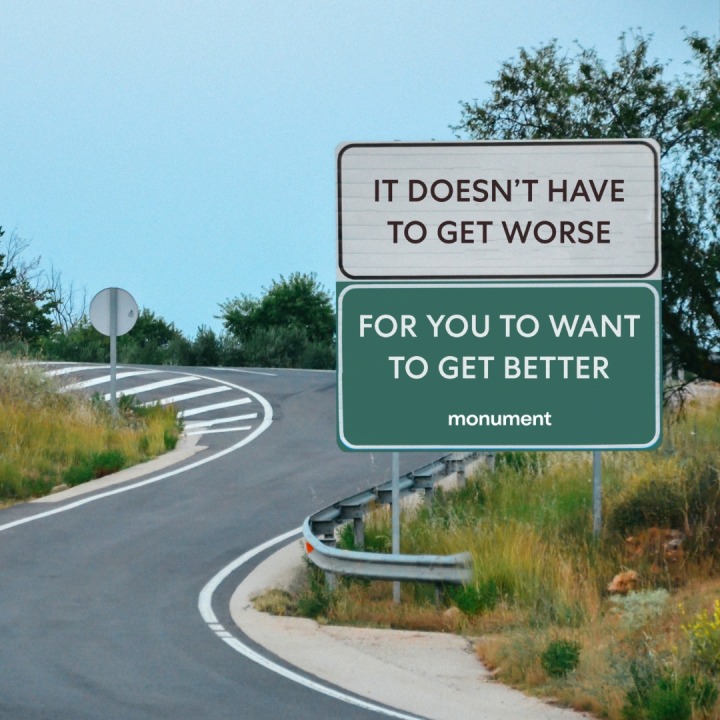Is rock bottom a prerequisite to sobriety? To be frank, absolutely not. Before I stopped drinking, I told myself my drinking habits weren’t *that bad*. On Facebook, it looked like I had it all together: teaching fitness classes and bartending while going to college and dating a good guy. But my reality was much darker. I drank to escape repressed trauma while self-medicating my clinical depression and anxiety. I told myself that I didn’t have a problem since I was able to juggle so much while keeping a rehearsed smile on my face. The question I’d pose to 20-something, whiskey chugging me (or anyone who’s curious about cutting back on booze) is, how bad do you want it to get?
What is Rock Bottom?
The term “rock bottom” refers to the belief that someone has to lose everything before they get sober. Hollywood often portrays these moments by depicting people who are down on their luck, experiencing homelessness, cut off from their loved ones, and unemployed—all because of their substance use. Tinsel Town’s visual representation of rock bottom may be true for some people, but not all. In fact, the lose-everything-before-you-stop-drinking trope is what kept me from getting help sooner.
When to Change Your Relationship with Alcohol
“Anytime is a good time to take care of yourself,” Lynn Macarin-Mara, LCSW, reminds us, “You’re in charge. Once you recognize that your drinking is self-destructive, you can stop. You don’t have to wait until all is lost. Why be mean to yourself? Why not look to be kinder and caring to the person that matters most… and that’s you!”.
Alcohol use disorder exists on a spectrum and should be treated as such. While I was able to stop drinking through peer support groups, therapy, and online communities, many people find that medically-assisted treatment such as detox or medication to stop drinking is most effective for them. Some people explore one treatment option and later decide to seek out others, and that’s perfectly normal. At Monument you can access specialized therapy, meet with physicians, and get peer support entirely online.
No matter what you might need, waiting until you’ve lost everything isn’t necessary to seek help. If you’re not ready to quit altogether, that’s okay. Maybe take a break from alcohol to give yourself the mental space to evaluate whether or not alcohol is adding any value to your life. If you’re interested in learning more about what life without alcohol might look like, become a member of Monument’s online community, all are welcome.

You Don’t Need to Hit Rock Bottom
At age 29, I took an honest look in the mirror and realized how booze held me back. I often complained that there wasn’t enough time to write or enough money to travel, but I always found time (and money!) to spend in a bar. My “rock bottom” moment came when I finally saw how alcohol was an unnecessary hurdle that I voluntarily placed in my path.
“Why do you need a rock bottom?” asks Jenn Payne, Recovery Coach. “Why can’t we just decide that we don’t want to drink anymore, and have that be an acceptable answer?”
Thanks to the rapidly-growing online sober space, people are echoing Jenn’s sentiments.
Terms like “elective sobriety”, “gray-area drinking”, and “sober curious” have finally flipped the age-old trope that losing everything is a prerequisite to re-evaluating one’s relationship with alcohol. And inclusive communities are helping people explore their relationship with alcohol, without having to commit to abstinence right away.
A Word About Alcohol Use Disorder
It’s imperative that we remember how dangerous alcohol use disorder can be.
“Sometimes a rock bottom can be a wake-up call but sometimes it can be deadly. It’s important to hold space for that,” says Keegan Herring, LPC, and mindfulness therapist, “Sometimes people don’t see their drinking as a problem because they’re so involved in their surroundings that they don’t see their use as objectively dangerous. When you use, you lower inhibitions, which exposes you to other risky behaviors that could lead to accidental death.”
Traditional communities like the 12-step community describe rock bottom as “when you decide to stop digging.” The nuance to this statement is that everyone has the choice to decide when and how you want to stop digging (a.k.a. drinking.) Losing everything is not required. Herring agrees.
“Rock bottom is the point at which you decide to make a change. It can even come in the form of relapse. It’s the awareness that there’s a problem.”
* * *
For me, that awareness came when I stopped comparing my relationship with alcohol to others’ relationships with alcohol. Once the comparison stopped, I could see how problematic my own drinking was.
I chose not to lose everything before I got sober. Something in me knew that there was something better on the other side of the bottle. Regardless of how or why someone decides to stop drinking, they don’t have to lose everything before taking steps to better their lives. All reasons for giving up booze are completely valid. No one needs approval or validation from anyone else to quit drinking.